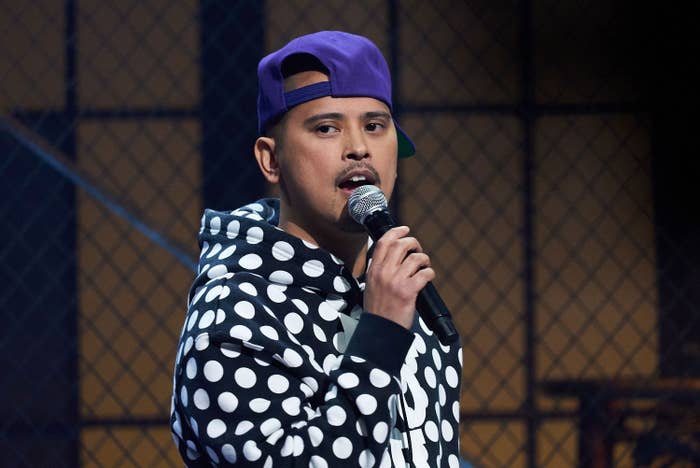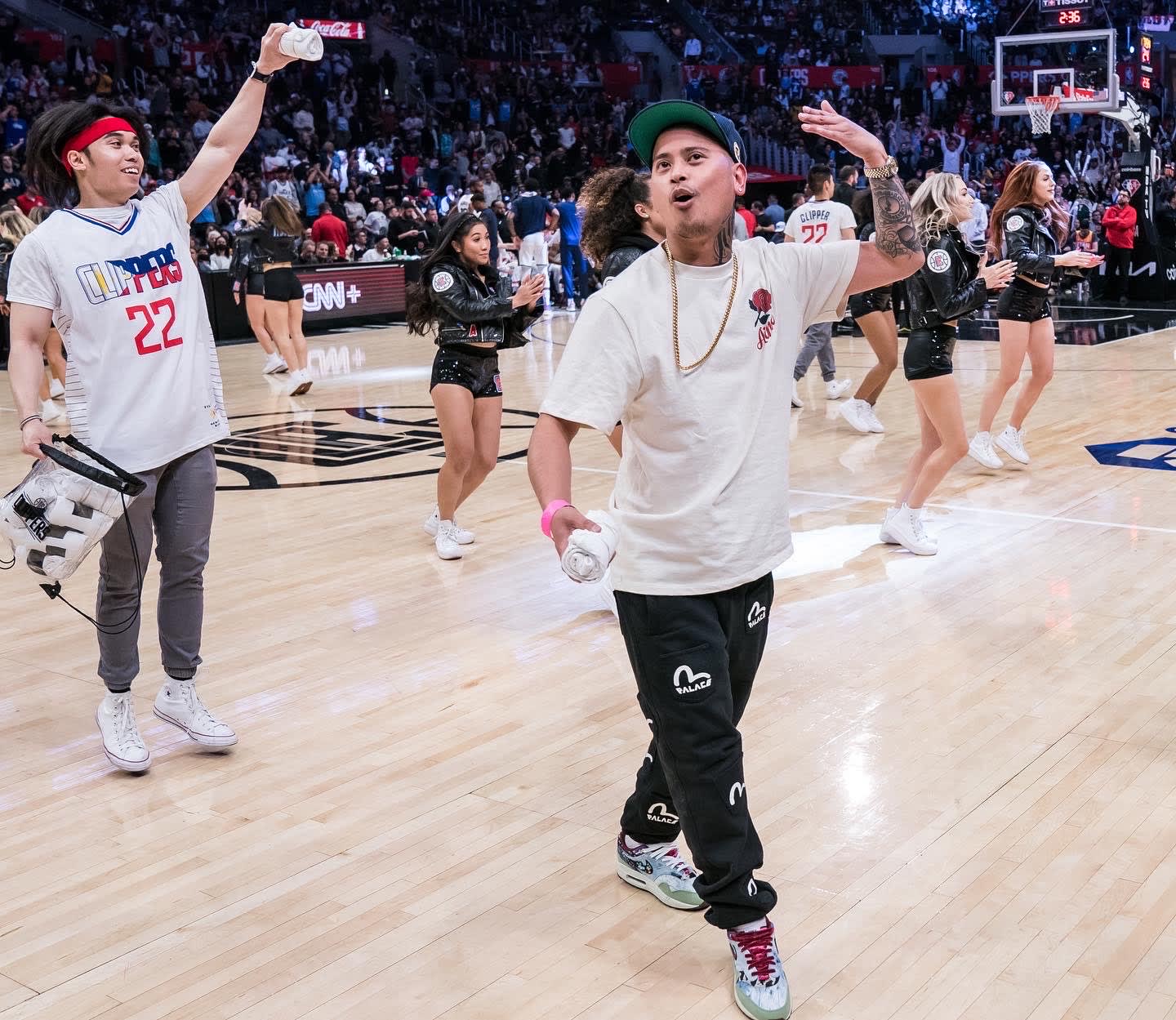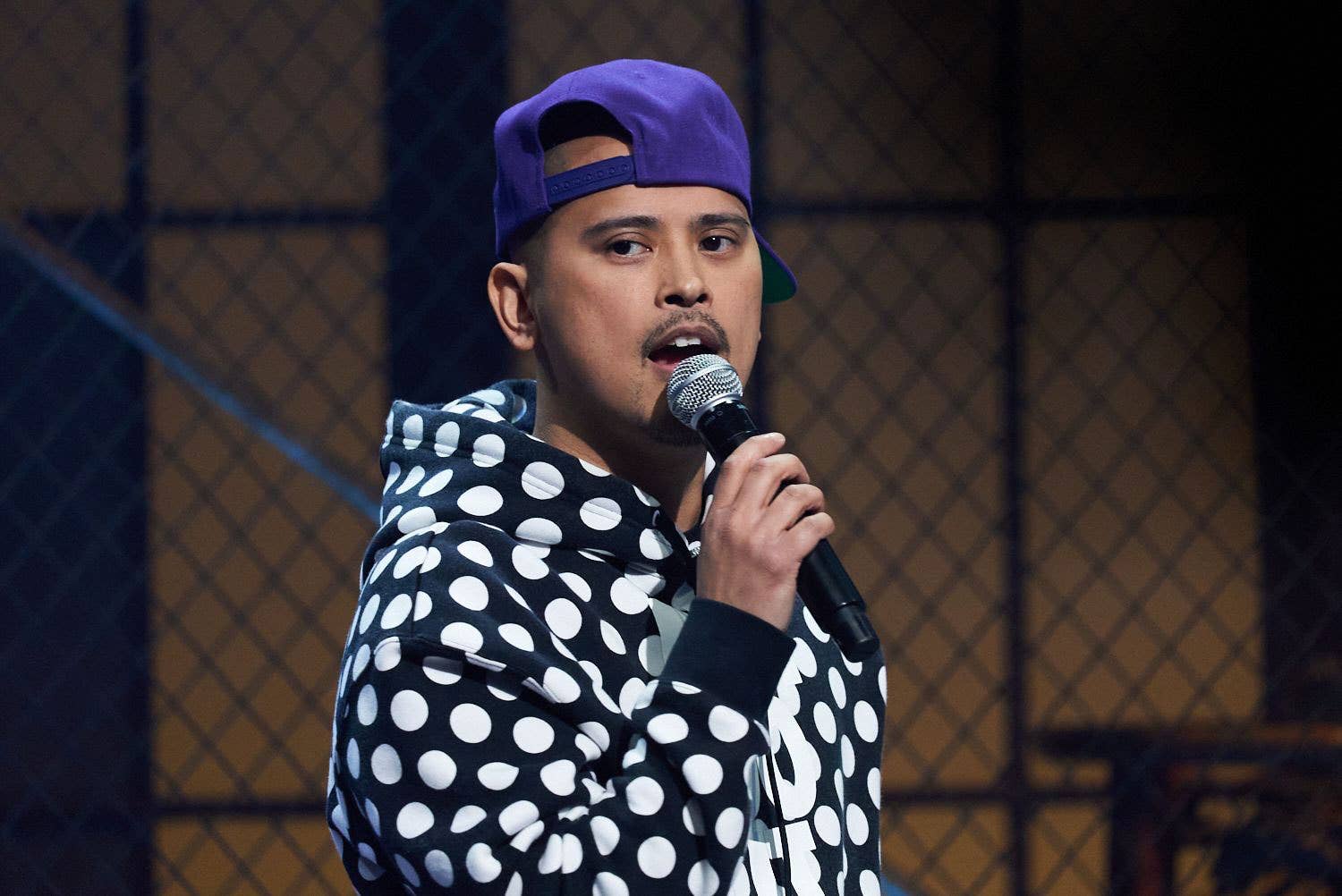
There’s a moment on Keith Pedro’s latest album, Trillipino, where the Toronto comedian drops a devastating truth bomb.
“Being white itself is a superpower, because even your weakness is still an advantage,” the Filipino-Canadian tells the crowd mid-way through a bit about race. The problem white people complain about most, he explains, is that they form wrinkles sooner than other ethnicities.
The punchline: “Yeah, it’s easy to get wrinkles fast when you’ve been fucking smiling your whole life!”
That’s a bar—a screamable one at that. And it’s one of many such uproarious, forthright, glad-someone-said-it moments on Trillipino, which is up for a Juno in the Comedy Album of the Year category. The set, recorded live in Toronto, captures Pedro’s style of smart-ass, observational stand-up comedy at its most unapologetically honest. Consider: on his 2015 debut album Grindecology, he cracks innocuous jokes about being able to tell a person’s age by their email address; on his latest, he talks about getting arrested and lambasts Dragon Ball Z for Goku’s blonde-haired, blue-eyed “super caucasian” power-up.
If you’ve ever caught one of Pedro’s sets, chances are you remember it well. The man’s been laying waste to comedy clubs since the mid-aughts, winning over rooms with his off-the-dome crowd work and kinetic, no-fucks-given energy. It’s no wonder he was chosen as an opener for the pilot episode for Russell Peters’ Roast Battle Canada (for which he recently got a Canadian Screen Award nomination), or tapped to do a set on Kevin Hart’s LOL Network. Dude’s an undeniable riot.
Lately, though, Pedro says he’s had more freedom to unscrew his comedic filter. You can say North America’s long overdue awakening to systemic racism the last couple years has helped. Growing up as a Filipino-Canadian and trying to succeed in a largely white-dominated industry, he’s certainly had some stuff to get off his chest. “I had all these things growing up that I wanted to say and then when this ethnic trend happened where white privilege became such a topic, I was like, well, I have so much shit to say,” Pedro tells Complex Canada.
The result? He’s even funnier now. Ahead of his Juno Comedy Show set in Toronto this Friday, Pedro chats about Canada’s changing (yet still limited) comedy landscape, the weird new phenomenon of studios trying to hit minority quotas, and getting to speak his gut-busting truth.
Keith, I’ve been rocking with you for a minute. Congrats on the Juno nomination, my guy! How’d it feel to get the nod?
Man, real talk. I told Barry, the producer [of Trillipino], “I don’t know if I should submit it.” I felt when I made this one, it was too real. If you listen to it, I say a lot of things and I pull no punches. I wasn’t expecting it to be [received like this], because when you think of the Canadian comedy industry, you’re thinking like John Candy or, you know, Russell Peters but when he does his accent—you’re not here watching some loudmouthed Filipino talk about why he’s upset that there’s chicken fingers and fries at the Mandarin. I’m just happy they took it in, bro. I’m not gonna lie, I was like, whoa, for real?
Yeah, that’s big for representation. Cause like you said, when you think of Canadian comics, you usually think of Jim Carrey, John Candy, Mike Myers. Basically all these white guys…
Russell is like the main Canadian ethnic guy, but even he played it kinda safe, you know? Which was what you had to do. He held it down and killed it. But I kinda want to be the Filipino voice without an accent. I’m trying to rep for the non-nurses and the non-Tim Hortons Double Double givers.
[Laughs.] Yeah, the non-personal support workers. That’s cool, man. It’s really great to see. So then, do you think this shows that the Canadian entertainment landscape is shifting in terms of diversity? What do you think?
I think, yeah, I think it is. I think it looks really good. I mean, as a guy who’s been doing this for 16 years—you saw me coming up, you saw the stuff that I had to go through. When you saw me at YukYuks, you probably saw all the other comedians and they were probably these white dudes, or it had to be this certain type of person—it had to be this nerdy Asian or very smart brown guy or very masculine lesbian. And it was always that. Even when I used to get auditions, either I was a) the prison snitch or b) the office nerd. I couldn’t just be a husband. [Laughs.] So I feel like now people actually want to hear our voices and our stories.
But it’s so weird now because as an ethnic comedian, I’ve never tried to be the ethnic one. I never wanted to be, “Oh, he’s the Filipino guy.” I just wanted to be the Canadian comedian who happened to be Filipino. Who happened to be ethnic. If you close your eyes, you wouldn’t know what I was. Because as a guy trying to make money in this industry, you gotta leave Toronto. You gotta go north of 400 and do those jokes. You gotta be universal. So I’m glad I can now jump back to my voice of just being me.
Interesting. So you really had to make sure your jokes would fly in those other parts of Ontario.
I’m not trying to shit on Canadian comedy. That’s just how it was. You just had to make white people laugh to make a living. But now, you can do your own thing and people are willing to listen. I just want the diversity to come with equality. I feel like nowadays people are forcing the diversity, but they’re not forcing the equality. Does that makes sense?
“I’m not trying to sh*t on Canadian comedy. That’s just how it was. You just had to make white people laugh to make a living. But now, you can do your own thing and people are willing to listen.”
Hmm. What do you mean by that?
Like, they’re always like, “Oh man, do the ethnic show.” But why do I gotta do the ethnic show? Just put me on the show! Now they’re putting me in this kinda [corner] like, “featuring the hottest Asian comedian.” But why can’t I just be on the Hot Comedians show? And then there’s like, I love that they’re open to diversity, but sometimes it feels like they’re not giving me the job because I’m good for it. Like, dude, don’t give me the job because there’s a hype around being ethnic or you’re guilty. Just give me the shit because I’m dope!
Is that something you’ve been encountering more with studios lately? Like, more people actively looking for ethnic comedians and trying to hit that minority quota?
Yeah, Black Panther did well at the box office, so they’re like, “Hmm…” Listen, I love representing the ethnic voice and I’m glad I’m doing it. But I just don’t like it when they position it like that. Just book me; don’t be all like, “Oh, we love your Asian voice. And 60 percent of our company is Asian, and we would love for you to come and do your stuff.” I’d rather you just hire me and trust that I’m a professional, and when I show up I’ll notice everybody’s Asian and I’ll just do my job. But at the same time, you saw how the media was before. I remember when I was a younger kid, me and my ethnic friends would count how many commercials it would take until we saw someone who looked like us. We would be like, “Alright, let’s see. That was eight commercials! It was a Nerf gun! It had to be the Black kid shooting the Nerf gun!” It was different before. So now, if this is how I’m invited to the party, then I’mma come to the party.

Talk about the album title Trillipino. What does that mean to you?
Well, you know, you’re a hip-hop fan. Complex is the only media outlet that I truly believe in, so this is a blessing that you guys are hitting me up. It represents the culture. So I feel like this is the perfect way to connect, because Trillilipino is an album that I wanted people like Complex to listen to, because it’s basically that. I’m a Canadian, North American-born Filipino who’s inspired by hip-hop. And this album is true and real—from the word trill—and so I was like, fuck it, Trillipino. I’m being as honest and true and real as can be. And I’m not just like this urban comedian, I’m also a dad. There’s just so many layers to it. When you hear the album, you aren’t gonna hear just one aspect of this guy.
“As a Canadian Filipino, even just as a full-bred Filipino from North America, there’s no formula for doing art. Any form of art. I went off straight f*cking gut instinct.”
You’re definitely being really, really real in this set. It’s funny, what you were saying earlier about having certain jokes you couldn’t tell in other parts of Canada. On this special, you really speak your piece. You go hard on the white privilege jokes!
White privilege became such a hot topic, and as an ethnic guy…. Like bro, put it this way. My name is Keith, man. My mom’s a hardcore Filipino. She can’t even pronounce my name. I go home and she’s like, “Kit, Kit, look at your room, Kit!” I asked my mom, why did you name me that? And she’s like, “When we first moved to Canada, the real estate agent was Keith, the dentist was Keith. We thought Keith was a powerful name.” You really think about that logic—they sacrificed their own comfort for me to get a name agreeable to a white person so they could read it, pronounce it. So I had all these things growing up that I wanted to say and then when this ethnic trend happened where white privilege became such a topic, I was like, well, I have so much shit to say
You finally get to tell these jokes.
Yeah. But these were the jokes that I would say amongst our friends; like amongst my family, you know, my cousins and shit. We’d be at the fucking Chinese buffet and I’m like, “What the fuck? Why are there chicken fingers and fries here? These white privileged motherfuckers! Who’s been complaining?!”

Right on, now everyone gets to hear about it. So I wanted to ask… what is it like out here for Canadian comedians nowadays? Something I hear from Canadian rappers all the time is that you can’t really make it here unless you go to the States. Is it the same deal for comedians?
When people ask me that, I always ask them, can you name me a famous Canadian person that doesn’t have American success?
Hmm…
Exactly. It’s hard. Like, Jay Baruchel? He still does a lot of Canadian stuff. He’s found a way to be successful here. There’s guys like Gerry Dee. Rick Mercer. Mark Critch. I guess these are all Canadian, upper-echelon guys who have their shows here and didn’t leave. But if you look at all those guys, and no offense to them, they fit a category of the Canadian demographic. You know, it’s unfortunate that someone like me can’t really host a CBC show. It’s the dead-on truth. I know what I look like and I know where I fit in and I know what my content is. As a Canadian artist, I think you have to really have to blow up stateside. I always say that Canadian entertainment is like that girl that left you but wanted you back after she saw you with a better girl. It’s like, bitch I was here this whole time! I loved you. I gave you everything.
And that still wasn’t enough!
But, you know, the thing about Canada is, it’s such a small market, right? It’s more of a dog-eat-dog world. Like, there’s almost two million more people in California alone than in Canada. So you got Alberta comics fighting each other to make it, you got Toronto comics fighting each other to make it, Vancouver comics too. Then you got this one festival that blows up, Just For Laughs, and you all gotta fucking fight just to get on that. But once you plateau there’s only so much you can do in Canada until they really fuck with you. Russell Peters just got his first TV show, Indian Detective. All it took him was 28 years of being a millionaire to get his first Canadian show! [Laughs.]
Well, hey, kids are still seeing you, talking about your own real experience being a Filipino-Canadian, and getting recognition for it. That’s gotta count for something. I’m sure growing up, you didn’t see too many people who looked like you in Canadian media. Especially not telling dick jokes and stuff.
Yeah, of course, man. When someone asks me, “Who was your formula growing up?” I realize, as a Canadian Filipino, even just as a full-bred Filipino from North America, there’s no formula for doing art. Any form of art. I went off straight fucking gut instinct. And now, like I was saying earlier, it’s tough to be in this little bubble, but man, I got this responsibility, you know? I’m paving the way and I’m representing a voice. I think that’s great. I don’t want to let anyone down that looks like me or sounds like me. And you don’t have to be just Filipino. You can be a dark-skinned Vietnamese dude with a goatee and a neck tattoo. You can be whatever, bro! [Laughs.] I’m trying to represent people. Before I even started comedy, I had some issues with the law, so there’s a way out. And you don’t have to be the safe ethnic; you don’t have to be the brown dude from Big Bang Theory all the time. You don’t gotta be Harold from Harold and Kumar. You can just be yourself. That’s what I want to represent. If I win the Juno or not, that nod is a win and lets people know that, yo, they’re listening to me.

